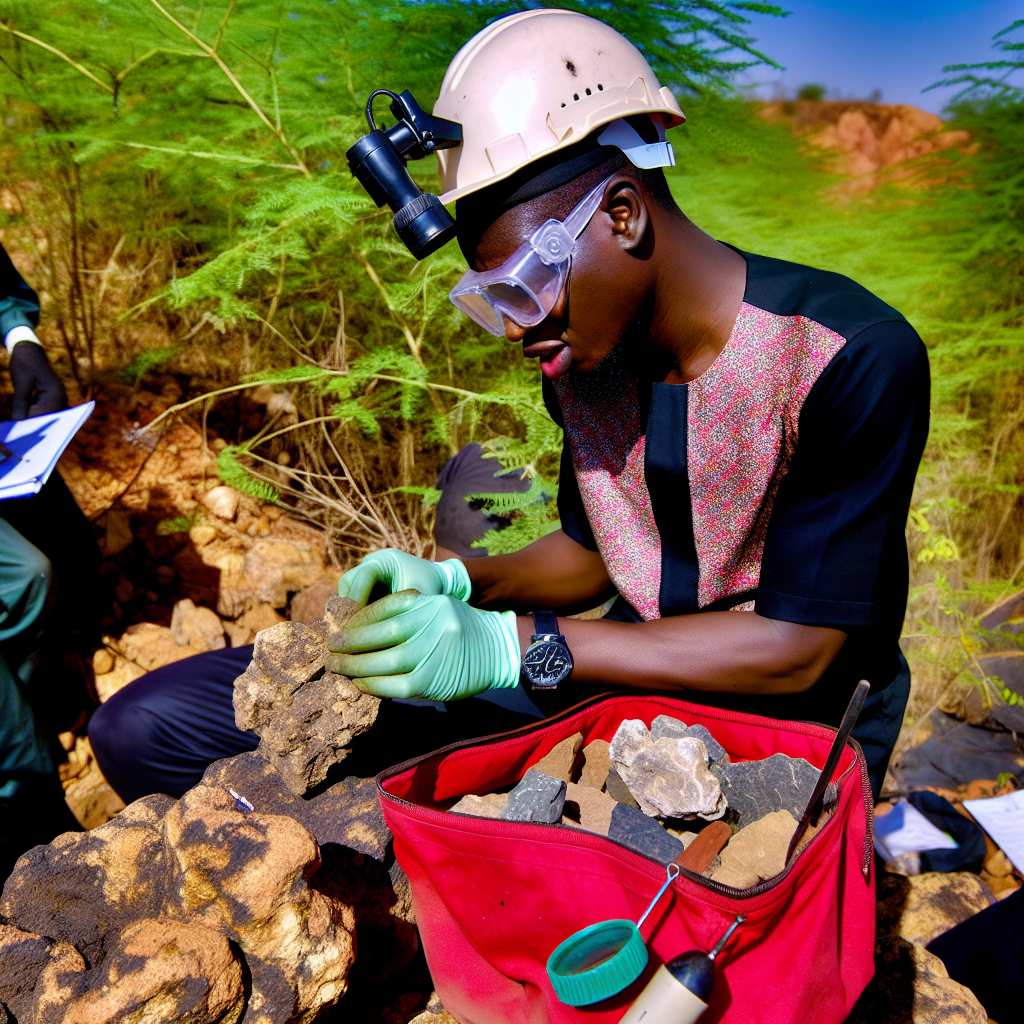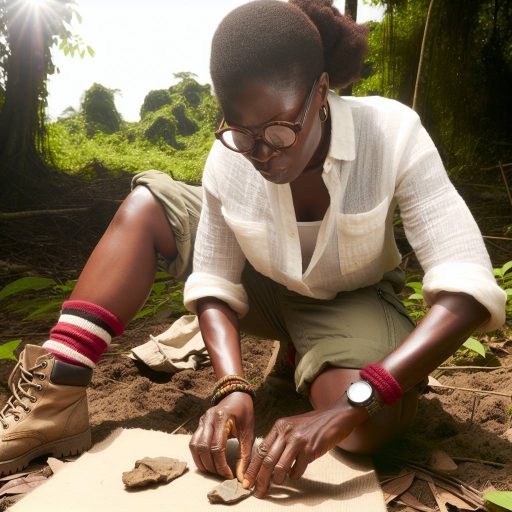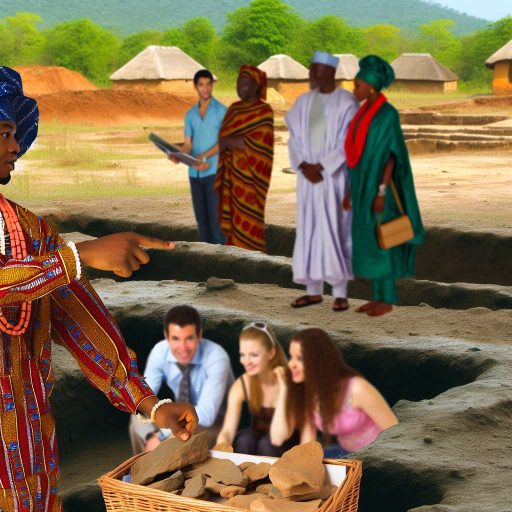Introduction
Nigeria, with its diverse geological landscape, offers a rich ground for geology projects.
Case studies play a crucial role in unraveling the complexities of this landscape.
Geology projects in Nigeria are essential for natural resource exploration.
These projects provide valuable insights into the country’s mineral deposits.
Moreover, they play a key role in environmental impact assessments.
These assessments help to mitigate potential risks associated with mining and drilling activities.
Additionally, these projects contribute to infrastructure development.
They provide information on geological hazards and suitable locations for construction projects.
Overview of Major Geology Projects in Nigeria
There are several key geology projects in Nigeria that have made significant contributions to the country’s economy and development.
- Oil and Gas Exploration in the Niger Delta Region
- Mineral Exploration in Jos Plateau
- Groundwater Studies in the North
Oil and Gas Exploration in the Niger Delta Region
The primary objective of oil and gas exploration in the Niger Delta region is to identify and extract petroleum resources for commercial purposes.
This project has had a significant impact on the local communities by providing employment opportunities and contributing to the country’s revenue.
However, it has also led to environmental challenges such as oil spills and pollution, affecting the ecosystem and livelihoods of the people in the region.
Mineral Exploration in Jos Plateau
The scope of mineral exploration in Jos Plateau includes identifying and extracting mineral resources such as tin, columbite, and tantalum.
This project has been crucial in diversifying Nigeria’s economy and providing raw materials for industries.
The local communities have benefited from job opportunities and increased economic activities.
However, the mining activities have also raised concerns about environmental degradation and land degradation in the area.
Groundwater Studies in the North
The primary objective of groundwater studies in the North is to assess and manage the water resources for sustainable use.
This project has been essential in addressing water scarcity issues and improving access to clean water for the local communities.
By implementing effective groundwater management practices, the project has helped mitigate water-related conflicts and promoted environmental conservation in the region.
Case Study 1: Oil and Gas Exploration in the Niger Delta Region
In the Niger Delta region, oil and gas exploration have a rich history dating back several decades.
- Exploration activities began in the late 1950s when oil was discovered in commercial quantities.
- Companies like Shell, Chevron, and ExxonMobil have been major players in the region.
- The geology of the Niger Delta presents unique challenges due to its complex sedimentary basins.
- The region is known for its prolific oil reserves but also faces issues such as high reservoir pressure.
Unfortunately, the exploration and production activities in the Niger Delta have had significant environmental impacts.
- Oil spills from pipelines and facilities have polluted waterways, farmlands, and fishing areas.
- Local communities have suffered from health problems due to exposure to oil and gas pollutants.
- Biodiversity loss and degradation of ecosystems have also been observed in the region.
Importance of Geological Studies
Geological studies play a crucial role in mitigating the risks associated with oil and gas exploration in the Niger Delta region.
- Understanding the subsurface geology helps in identifying potential oil and gas reservoirs.
- Geological mapping allows for the prediction of fault lines and areas prone to oil spills.
- Seismic studies help in determining the structure and depth of reservoirs for efficient extraction.
- By conducting detailed geological studies, companies can minimize environmental impacts and protect local communities.
Oil and gas exploration in the Niger Delta region has been both a boon and a bane.
- While it has brought economic development, it has also caused environmental degradation.
- It is vital for companies to prioritize geological studies to ensure sustainable practices in the region.
Gain More Insights: Career Paths in Applied Biochemistry in Nigeria
Mineral Exploration in Jos Plateau
The Jos Plateau region in Nigeria is well-known for its rich mineral deposits.
This makes it a hub for mineral exploration projects.
The significance of mineral exploration in this area cannot be overemphasized.
It plays a crucial role in the country’s economy.
Geology of the Jos Plateau Region
- The Jos Plateau is located in the central part of Nigeria and covers an area of about 8600 square kilometers.
- The region is characterized by a series of rugged plateaus and hills.
- Elevations range from 1200 to 1800 meters above sea level.
- Geologically, the area is rich in minerals such as tin, columbite, lead, zinc, and tantalite, among others.
- The mineralization of the Jos Plateau is primarily associated with granitic rocks and metamorphic processes.
Economic Impact of Mining Activities
- Mining activities in the Jos Plateau region have had a significant impact on local communities and the Nigerian economy.
- The mining of tin, columbite, and other minerals has attracted investment and created job opportunities for the local population.
- However, the mining industry has also been associated with environmental degradation, health hazards, and social conflicts in the region.
- Efforts to mitigate these negative effects have been made through various sustainable mining practices.
Sustainability of Mineral Exploration Projects in Nigeria
As Nigeria continues to develop its mineral resources, the sustainability of mineral exploration projects becomes paramount.
Responsible mining practices are essential to ensure the long-term economic, social, and environmental benefits of mining activities.
Importance of Responsible Mining Practices
- Responsible mining practices focus on minimizing the environmental impact of mining operations.
- These practices protect the rights of local communities and promote sustainable development.
- By adopting best practices in mine planning, waste management, and reclamation, mining companies can reduce their ecological footprint.
- Furthermore, engaging with local stakeholders and communities helps build trust.
- It fosters economic development and promotes social responsibility within the mining industry.
- Responsible mining practices also involve compliance with regulations and transparency in reporting.
Mining companies can contribute to the development of Nigeria’s mineral resources sustainably and socially responsibly.
Delve into the Subject: Nigeria’s Biodiversity: An Ecological Perspective

Groundwater Studies in the North
Groundwater studies play a crucial role in addressing water scarcity and quality issues in the North of Nigeria.
With the region facing challenges such as population growth, urbanization, and climate change, understanding and managing groundwater resources are essential.
Importance of Groundwater Studies in the North
- Groundwater is a vital source of water for domestic, agricultural, and industrial use in the North.
- Studies help in determining the quantity, quality, and distribution of groundwater resources.
- Identifying aquifers and their characteristics is crucial for sustainable water supply.
- Groundwater studies provide valuable data for developing water management strategies.
- They aid in mitigating the impacts of water scarcity and ensuring water security.
Role of Geologists in Mapping Aquifers
Geologists play a key role in mapping aquifers, which are underground layers of rock or sand that hold water.
By conducting geological surveys and utilizing geophysical techniques, geologists can identify potential groundwater reservoirs and assess their storage capacity.
- Geologists use technologies like ground-penetrating radar and electrical resistivity to map aquifers.
- Mapping aquifers helps in locating the most suitable sites for boreholes and wells.
- Understanding the geology of an area is essential for predicting water quality and recharge rates.
- Geologists also analyze the flow of groundwater to determine sustainable extraction rates.
Role of Geologists in Monitoring Water Resources
Geologists are responsible for monitoring water resources to ensure their sustainable use and management.
By collecting data on water levels, quality, and usage patterns, geologists can assess the health of aquifers and identify potential risks such as over-extraction or contamination.
- Geologists use tools like piezometers, water level loggers, and chemical sensors for monitoring.
- Monitoring helps in detecting changes in groundwater quantity and quality over time.
- Geologists analyze trends to provide early warnings of potential water resource problems.
- Regular monitoring is essential for effective water resource planning and conservation.
Role of Geologists in Implementing Water Management Strategies
Geologists play a critical role in implementing effective water management strategies to optimize the use of groundwater resources in the North.
By working closely with government agencies, environmental organizations, and local communities, geologists can help design policies and initiatives for sustainable water development.
Transform Your Career with Expert Guidance
Get personalized mentorship consulting that’s tailored to your unique path. Our expert advice is actionable and exclusive.
Get Started- Geologists provide expert advice on sustainable groundwater extraction practices.
- They assist in developing groundwater protection plans to safeguard water quality.
- Geologists collaborate with stakeholders to promote community awareness and participation in water management.
- Implementation of water management strategies is key to ensuring long-term water security in the North.
Groundwater studies and the role of geologists are crucial in addressing water scarcity and quality issues in the North of Nigeria.
By conducting thorough investigations, mapping aquifers, monitoring water resources, and implementing effective management strategies, geologists can contribute significantly to sustainable water development and security in the region.
Learn More: Geology Internships and Industrial Training in Nigeria
Geology Projects in Nigeria
Geology projects in Nigeria have proven to be crucial in understanding the country’s natural resources.
Exploration activities have uncovered valuable mineral deposits and helped in resource management.
Case studies have documented the geological history of different regions in Nigeria.
Through these studies, researchers have been able to identify mineral potential areas.
Fieldwork plays a significant role in verifying the geological information gathered from case studies.
Geological mapping has been instrumental in understanding the structure of the earth’s crust in Nigeria.
From these studies, geological hazards like landslides and earthquakes can be predicted.
The data collected from case studies aid in making informed decisions for land use planning.
Furthermore, these projects provide insight into environmental conservation practices in Nigeria.
Case studies are essential in guiding sustainable development practices in geology projects.
Geology case studies in Nigeria are crucial for resource management and environmental conservation.
The country needs more research and investment to ensure sustainable development in geology projects.
Additional Resources
Soil and groundwater contamination by crude oil spillage … – Frontiers
Social sustainability under threat: a case of two collapsed buildings …




